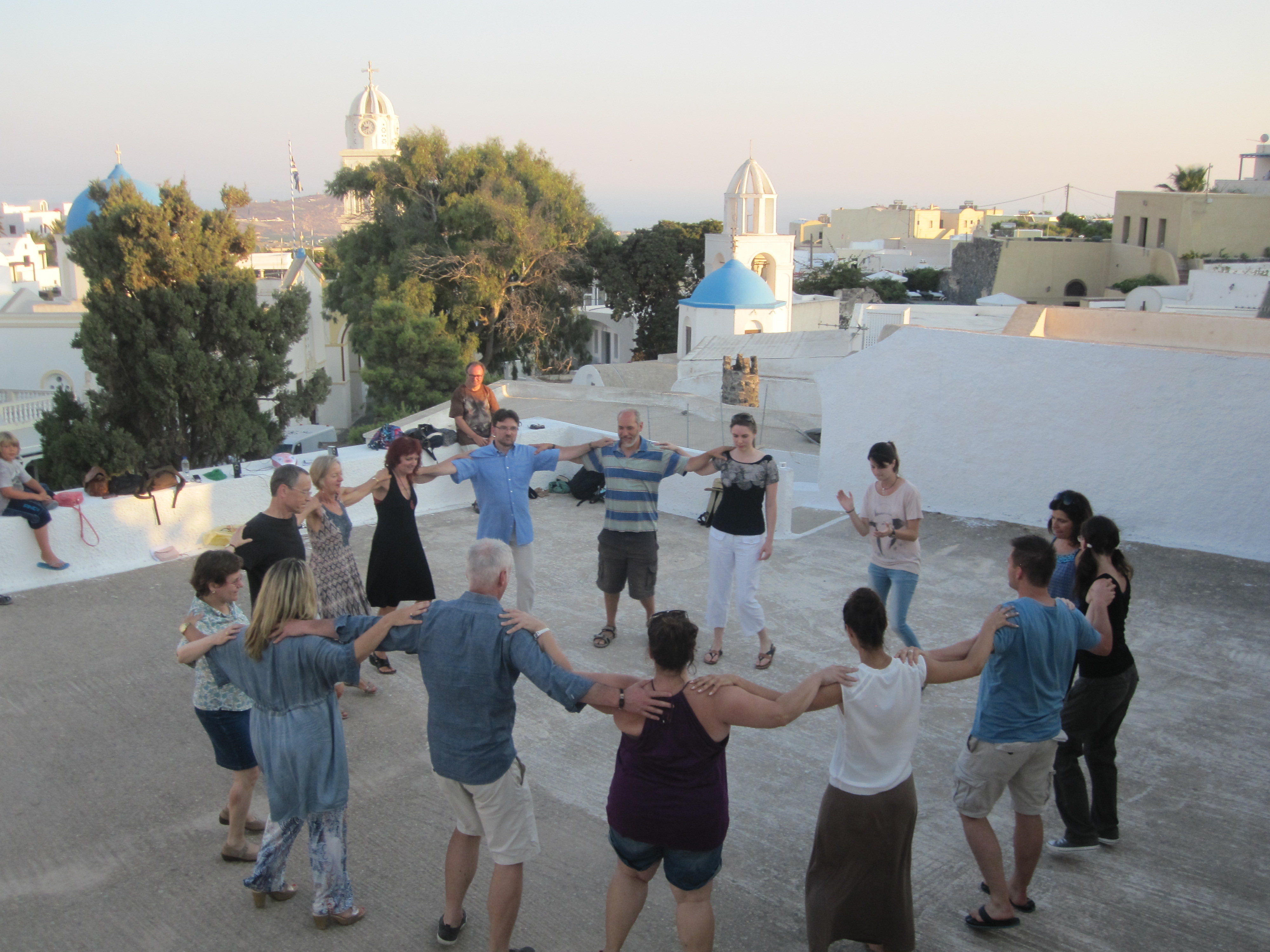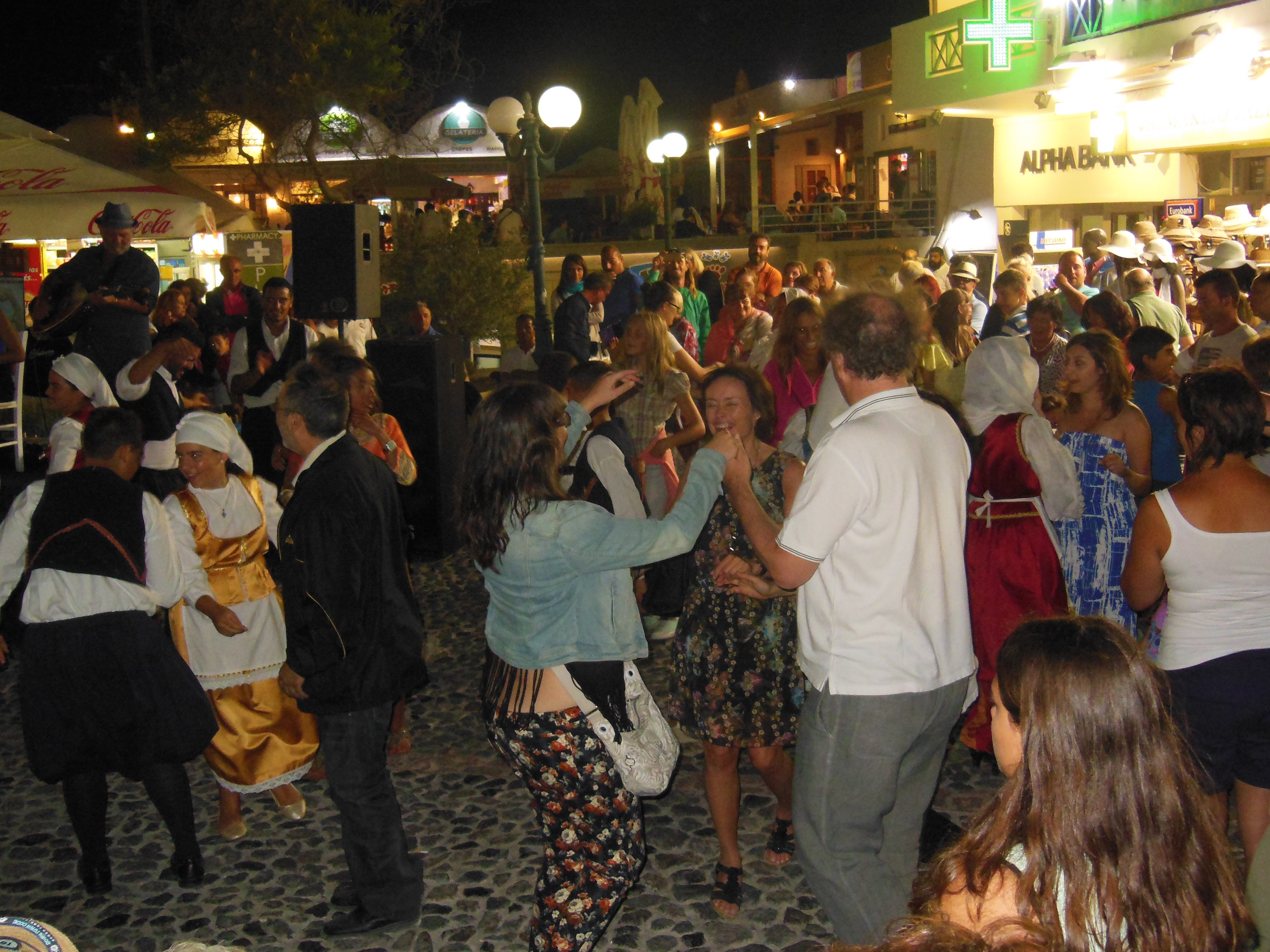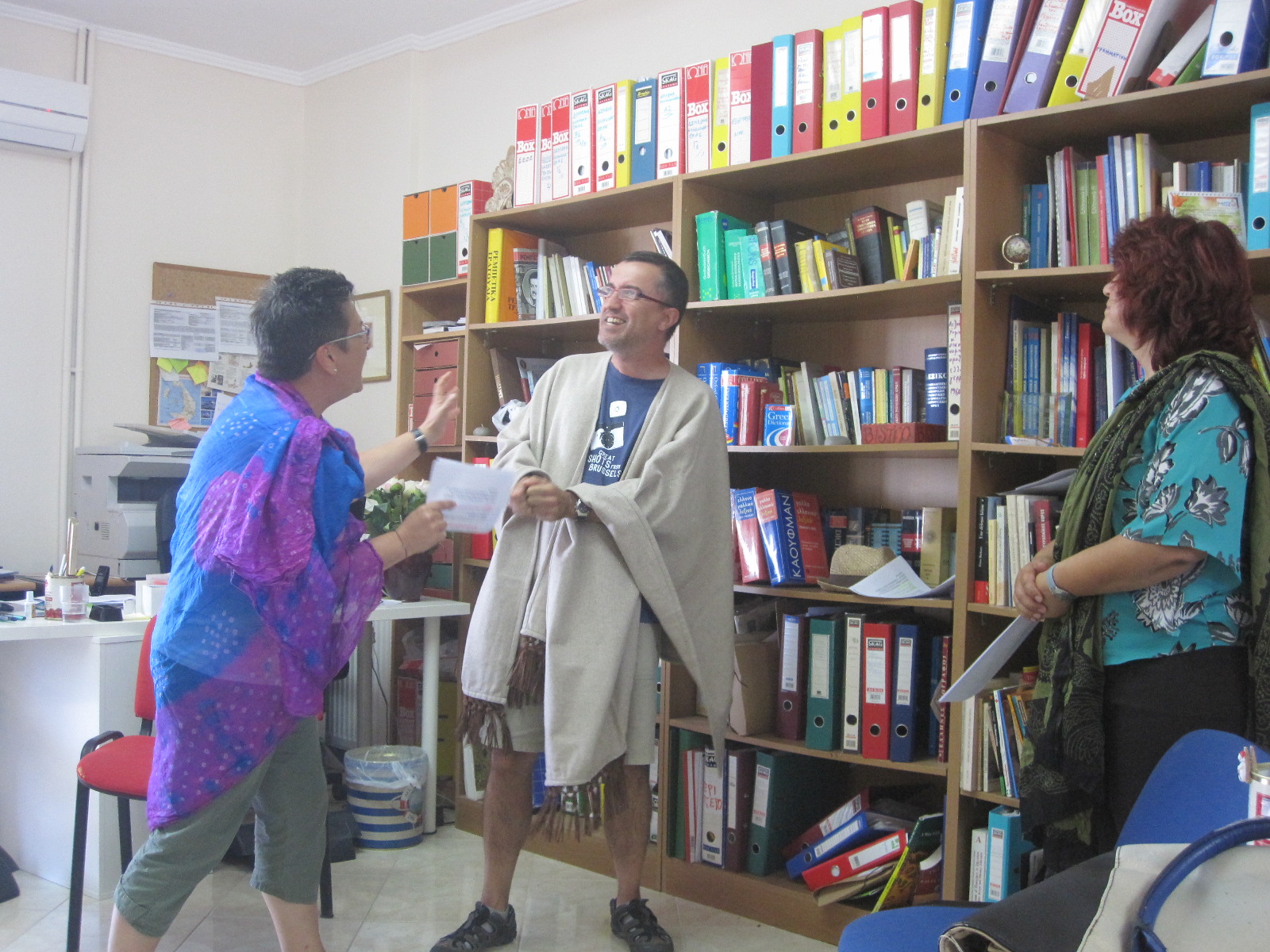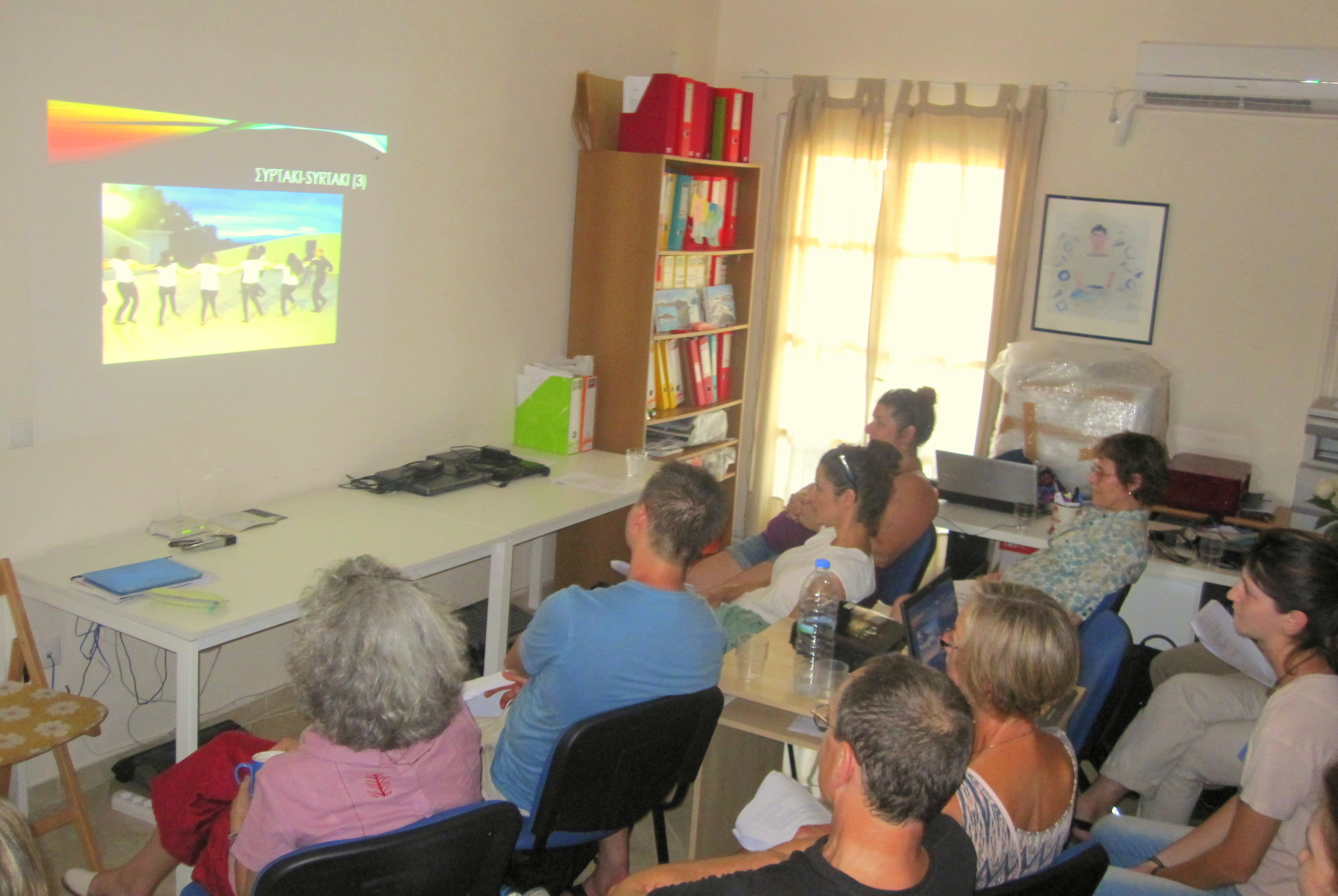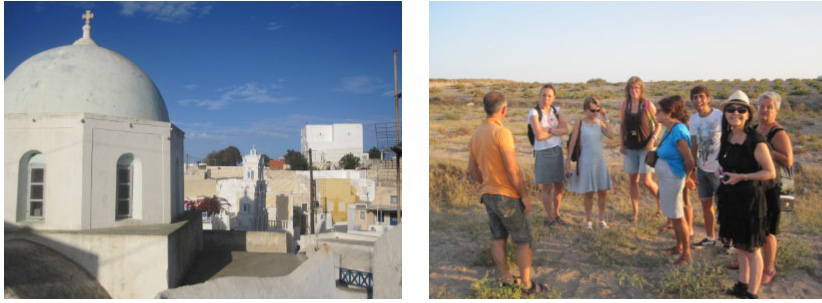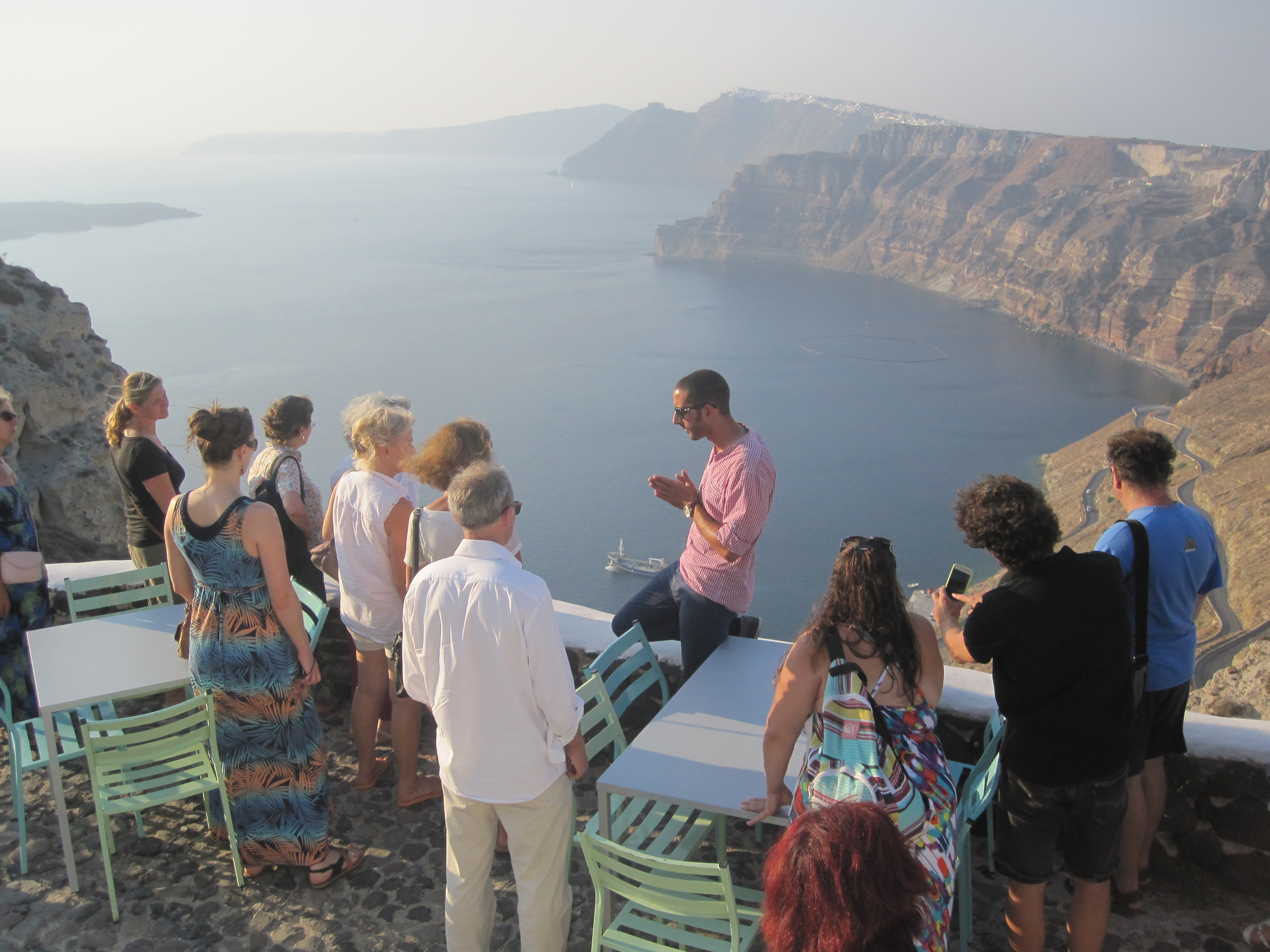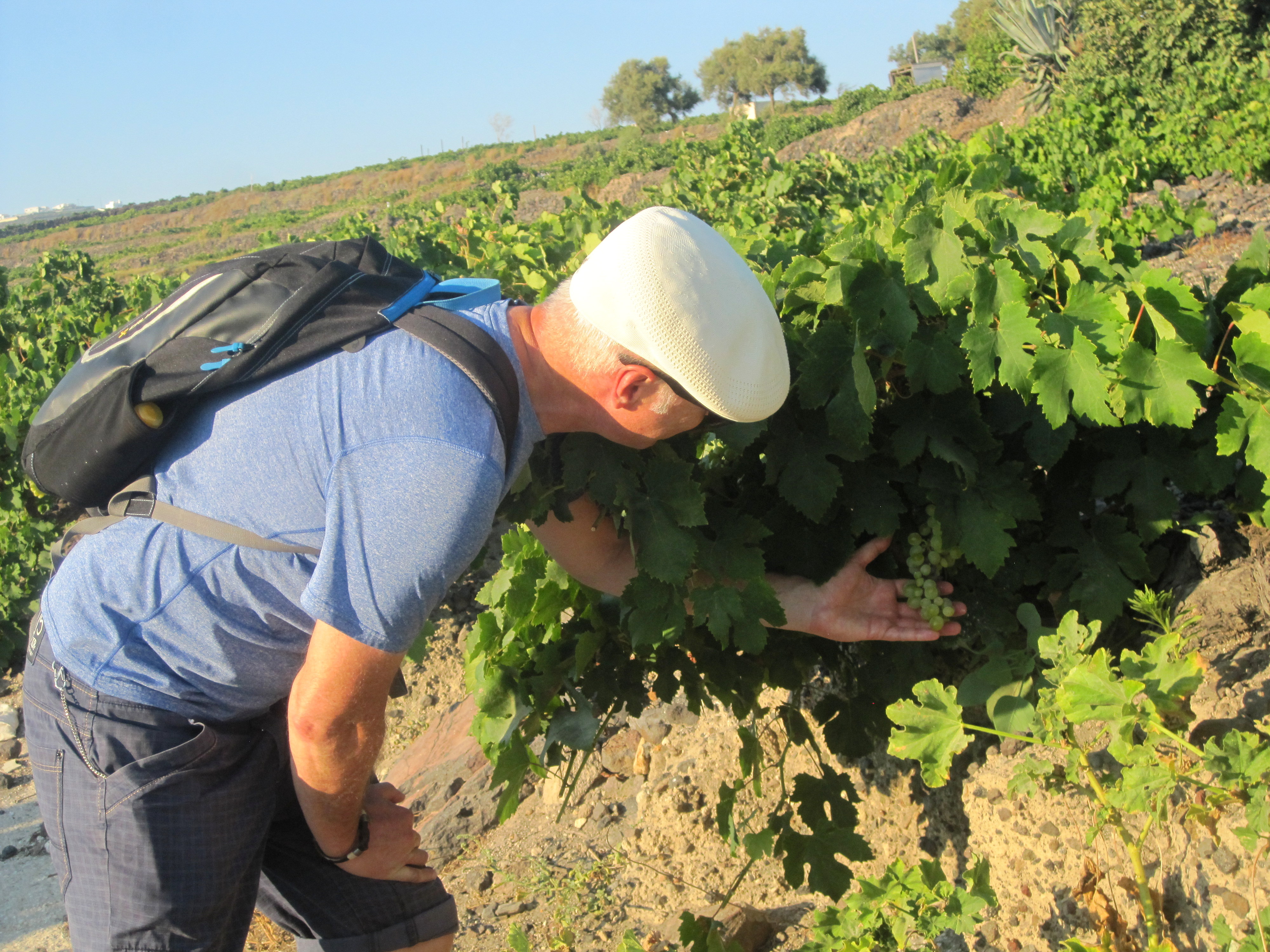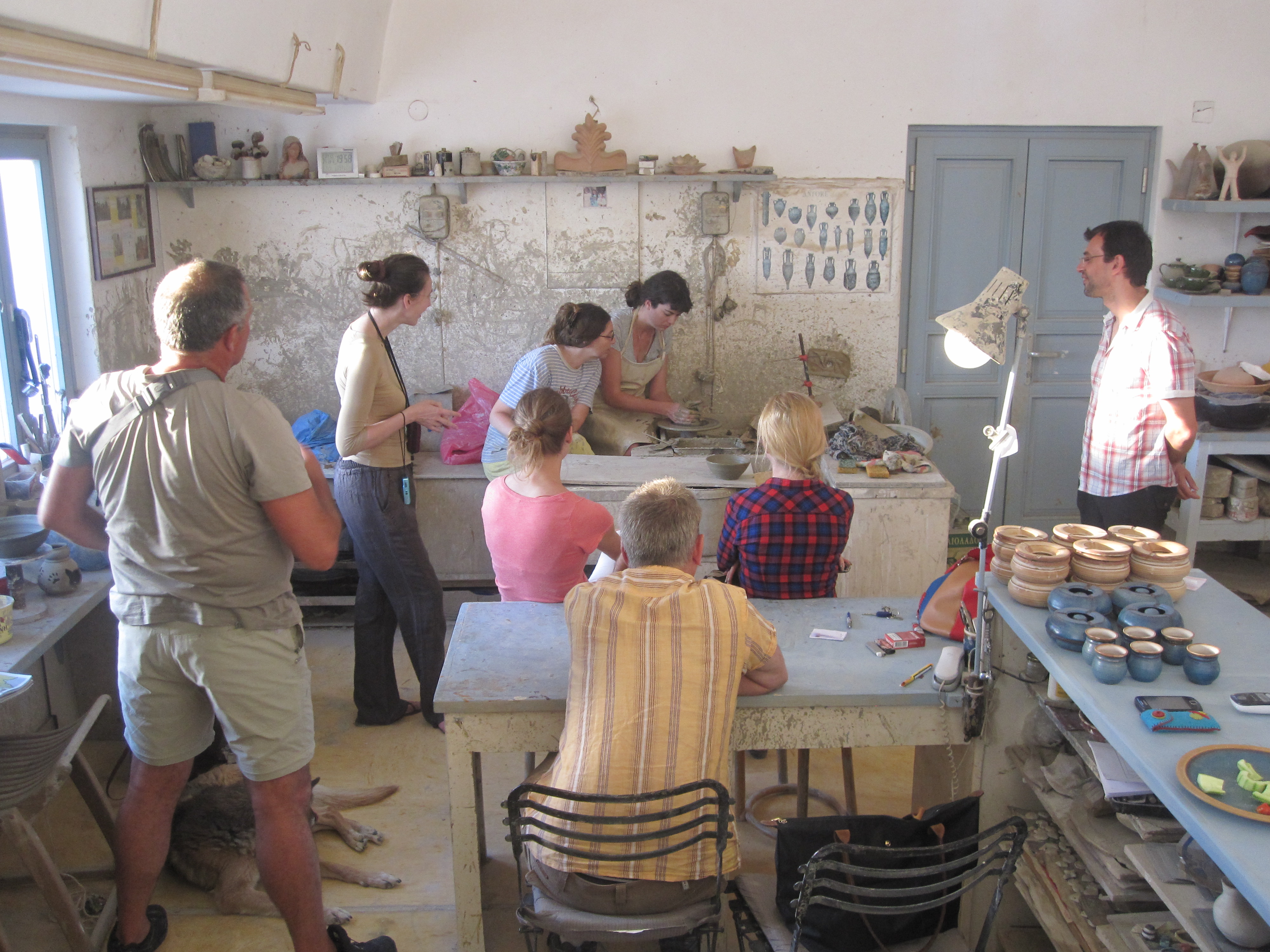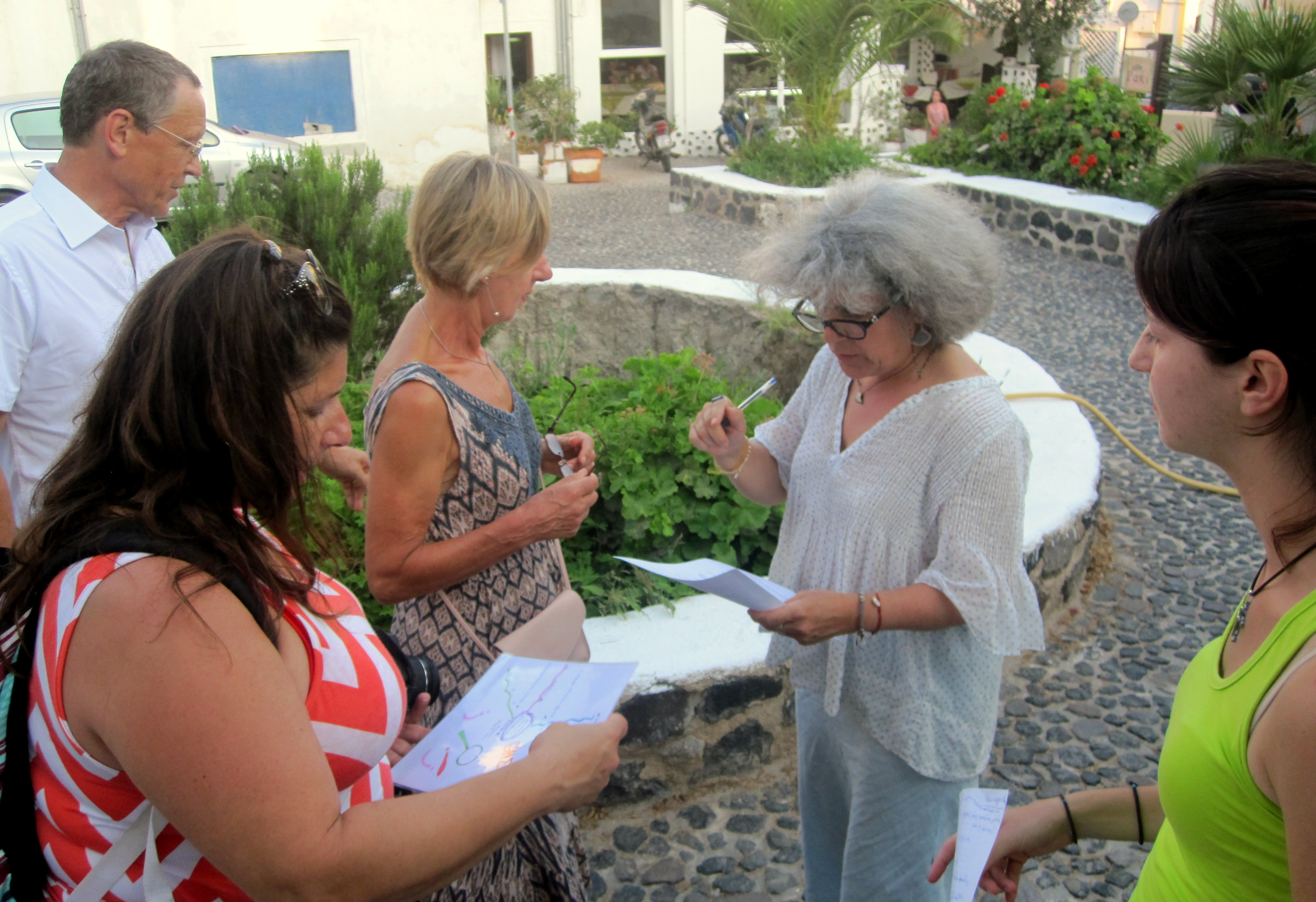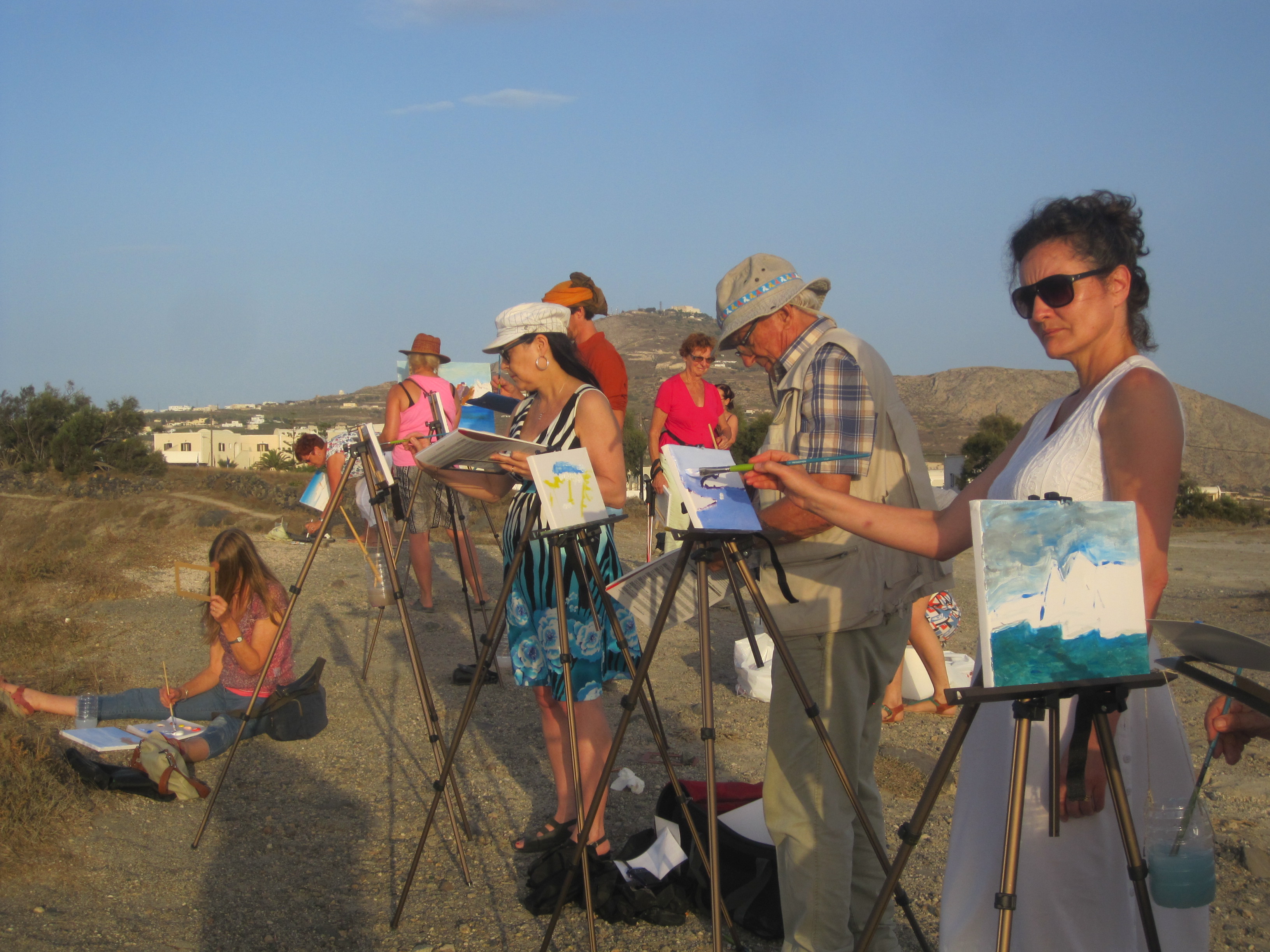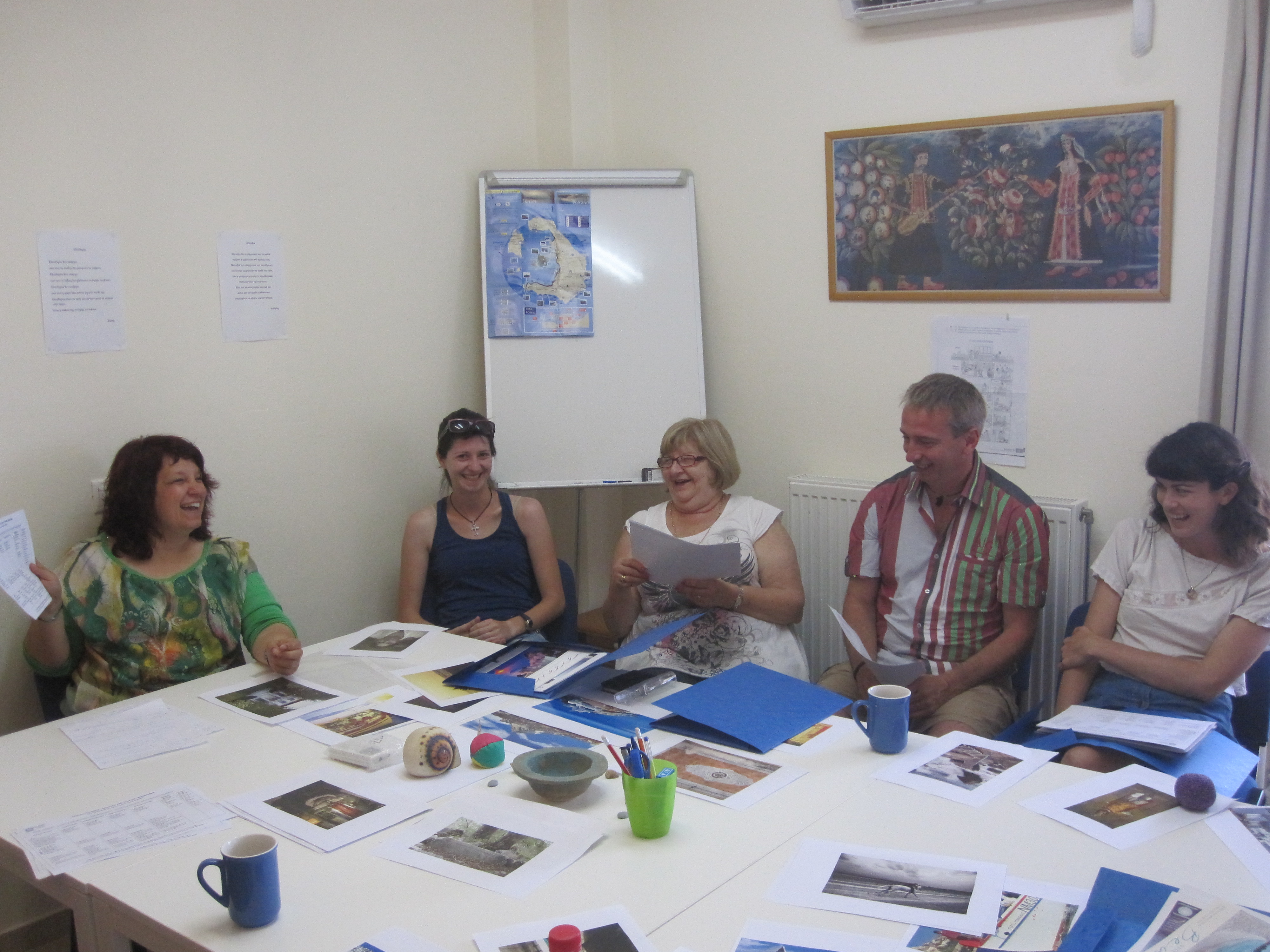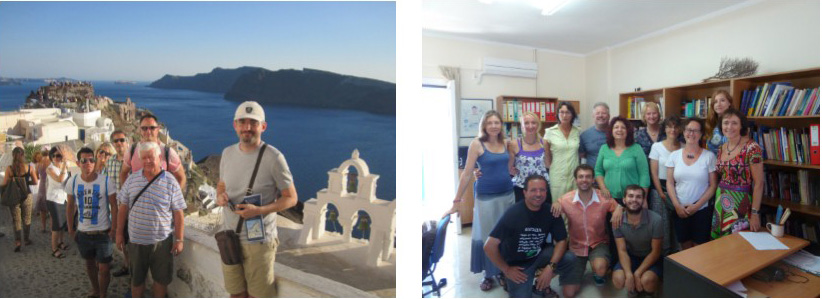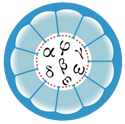Greek language and Culture Integrated Programme (all levels)
Sessions
(all sessions will take place in Megalochori, Santorini Island, Greece)
| 2015: 6-17/4/2015 15-26/6/2015 29/6-10/7/2015 13-24/7/2015 27/7-7/8/2015 10-21/8/2015 24/8-4/9/2015 7-18/9/2015 |
2016: 25/4-6/5/2016 13-24/6/2016 27/6-8/7/2016 11-22/7/2016 25/7-5/8/2016 8-19/8/2016 22/8-2/9/2016 5-16/9/2016 |
2017: 10-21/4/2017 12-23/6/2017 26/6-7/7/2017 10-21/7/2017 24/7-4/8/2017 7-18/8/2017 21/8-1/9/2017 4-15/9/2017 |
SEMINAR PROGRAMME
Day 1 (Monday)
- Presentation of the participants and their organizations
- Presentation of the seminar’s programme and the trainers (educational contract)
- Greek Language Lesson
- Greek Language Workshop
- Educational and Cultural Activities*
Day 2 (Tuesday)
- Greek Language Lesson
- Greek Language Workshop
- Educational and Cultural Activities*
Day 3 (Wednesday)
- Greek Language Lesson
- Greek Language Workshop
- Educational and Cultural Activities*
Day 4 (Thursday)
- Greek Language Lesson
- Greek Language Workshop
- Educational and Cultural Activities*
Day 5 (Friday)
- Greek Language Lesson
- Greek Language Workshop
- Interim evaluation of the course
- Educational and Cultural Activities*
Day 6 (Monday)
- Greek Language Lesson
- Greek Language Workshop
- Educational and Cultural Activities*
Day 7 (Tuesday)
- Greek Language Lesson
- Greek Language Workshop
- Educational and Cultural Activities*
Day 8 (Wednesday)
- Greek Language Lesson
- Greek Language Workshop
- Educational and Cultural Activities*
Day 9 (Thursday)
- Greek Language Lesson
- Greek Language Workshop
- Educational and Cultural Activities*
Day 10 (Friday)
- Greek Language Lesson
- Greek Language Workshop
- Final Evaluation of the course - formation of the contact network
- Educational and Cultural Activities*
*Educational and Cultural Activities:
Some of the activities below will be included to your 2015 programme for free, in case you attend the two-week Integrated Greek Language and Culture Programme :
1. Megalochori village: its history and sites
2. Presentation of Santorini Island
3. Greek Culture: traditional dances
4. Greek Culture: Greek songs
5. Greek Culture: visit to an artist’s atelier
6. Visit to the traditional village Pyrgos and its castle
7. Visit to a local producer and discussion on the local products
8. Language Games in Greek
9. Visit to the Archeological Museum of Fira and sight seeing
10. Greek Culture: a tribute to Greek Music
11. Greek Culture: cookery lesson in Megalochori Square in the traditional tavern Raki/ Dinner with what we have cooked
12. Guided tour at the Santo Wines Oenotourism Centre and video screening of winery tradition. Tasting of Santorini wines on the top of the Caldera cliff.
13. Visit to the archaeological site of Akrotiri
14. Visit to the ceramist Andreas Makaris at Megalochori and ceramics lesson
15. Boat trip to the volcanic islands of Nea and Palea Kameni and to Thirasia
16. Visit to the Maritime Museum,Oia
17. Visit to the Folklore Museum of Santorini in Fira
18. Visit to the Tsambouna Workshop in La Ponta Castle in Akrotiri
19. Open air cinema in Kamari, in one of the 10 best open air cinemas in the world
Tuition fee: 70 €/ day/ person, which includes tuition and training materials.
LEARNING OUTCOMES
Depending on the Language Level they will follow, at the end of the seminar participants are expected:
A0 of the European Language Portfolio
Participants are expected to have developed all four language skills in Greek. More specifically, participants will have developed the basic vocabulary in Greek, they will be able to respond to basic communicational circumstances, and the will know the basic Greek grammar. They will cover material included in the level A1 (course A1a) of the European Language Portfolio. http://www.hcc.edu.gr/images/Syll_A0.pdf
A1 of the European Language Portfolio
Participants are expected to have developed all four language skills in Greek. More specifically, participants will have developed the basic vocabulary in Greek, they will be able to respond to basic communicational circumstances, and the will know the basic Greek grammar. They will cover material included in the level A1 (course A1b, A1c) of the European Language Portfolio. http://www.hcc.edu.gr/images/Syll_A1.pdf
A2 of the European Language Portfolio
Participants are expected to have developed all four language skills in Greek. More specifically, participants will have developed the ability to express themselves in more complex situations (descriptions, narrations, feelings, plans for the future). They will cover material included in the level A2 (course A2a, A2b, A2c) of the European Language Portfolio. http://www.hcc.edu.gr/images/Syll_A2.pdf
B1 of the European Language Portfolio
Participants are expected to have developed all four language skills in Greek. More specifically, participants will enrich their vocabulary in subjects like the family, work and free time, and they will learn the passive voice, participles, special (irregular) nouns and adjectives, the use of prepositions and conjunctions. They will cover material included in the level B1 (course B1a, B1b, B1c) of the European Language Portfolio. http://www.hcc.edu.gr/images/Syll_B1.pdf
B2 of the European Language Portfolio
Participants are expected to have developed all four language skills in Greek. More specifically, participants will complete their knowledge of the basic grammar (using cases, tenses, irregular adjectives and nouns, compound verbs, pronouns, imperative), and they will enrich their vocabulary (everyday language in big cities, idioms). They will cover material included in the level B2 (course B2a, B2b, B2c) of the European Language Portfolio. http://www.hcc.edu.gr/images/Syll_B2.pdf
C1 of the European Language Portfolio
Participants are expected to have developed all four language skills in Greek. More specifically, participants will enrich their vocabulary (official letters, essays, idioms, proverbs, special vocabulary, and they will study more complex language forms. They will cover material included in the level C1 (course C1a, C1b, C1c) of the European Language Portfolio. http://www.hcc.edu.gr/images/Syll_C1.pdf
C2 of the European Language Portfolio
Participants are expected to have developed all four language skills in Greek. More specifically, participants will enrich their vocabulary, they will study local idioms and elements of Katharevousa and ancient Greek language, they will be able to to express themselves in a clear and persuasive way and have an everyday/fast rhythm of speaking. They will cover material included in the level C2 (course C2a, C2b, C2c) of the European Language Portfolio. http://www.hcc.edu.gr/images/Syll_C2.pdf
Students of all levels are expected:
- To be familiar with many aspects of contemporary Greek culture (the Arts, history, society, nature)
- To have explored the contemporary Greek reality, as they will get in contact with local population
- To visit places of natural beauty and cultural significance
- To have exchanged intercultural experiences
METHODOLOGY
The course is based on the principles of participatory adult education. The method used is the communicative one, which brings out the communicative aspect of the language. Moreover, the course follows the principles of modern didactics of living languages, which gives emphasis to culture. During the course active learning and exchange of ideas and information about other cultures are encouraged, while the experienced of the participants are incorporated into the training. The abovementioned methodology is implemented via a daily schedule which includes two hours of language instruction, and two hours of language workshop, where participants have the opportunity to practice the language skills they have developed during the day through language games, role plays and other activities. They also better understand the cultural framework within which the linguistic types of Greek are developed and used. A daily schedule of educational/ cultural activities is incorporated into the programme, enabling participants to become familiar with elements of the traditional and contemporary Greek culture. These activities include Greek dances’ lessons, Greek cookery classes, visits to Museums and other places of cultural interest, excursions to Santorini Island. This programme of activities is considered as an inextricable part of the course, since it provides the participants with a better understanding of contemporary Greeks and contemporary Greek culture.
Preparation
Participants will be given information on the subject of teaching or learning Greek today in Europe as well as lists for the most recent publications of didactic materials. Before the course, they will be asked to describe the institution they work for and the basic characteristics of its learners and their own professional background. Participants will also receive information for the course group (trainers, organizers and organizing institution, other participants). Organizers will be responsible for sending all necessary information regarding the venue and the trip. All the above will be communicated via e-mail.
Follow-up
Upon completion of the course, a network of Greek language’s and Greek culture’s friends will be formed though the HCC’s web-site and social media. The members of this network will be interested in improving their skills and Greek, and have positive feeling towards contemporary Greece. The network’s participants will be receiving information on the developments concerning learning Greek, on programmes and initiatives taken in Europe regarding this subject, as well as on critical developments in Greece which require action and initiative by the European citizens.


